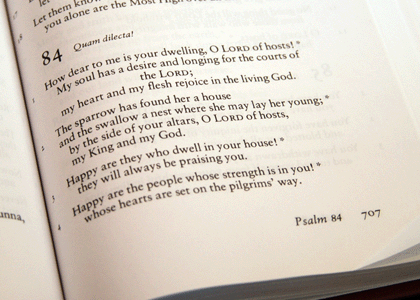Countering Temptation, Part 1
I remember being taught from a very early age that, when tempted, Jesus responded by quoting Scripture and that, since He is our Example, we ought to memorize Scripture, so when we are tempted, we can quote it, too.
“How can young people keep their way pure?
By guarding it according to your word.”
“Thy word have I hid in my heart,
that I might not sin against Thee.”
It is best to begin the process early, as Paul wrote to Timothy: “But as for you, continue in what you have learned and firmly believed, knowing from whom you learned it, and how from childhood you have known the sacred writings that are able to instruct you for salvation through faith in Christ Jesus.”
This is a duty God lays on parents: “Keep these words that I am commanding you today in your heart. Recite them to your children and talk about them when you are at home and when you are away, when you lie down and when you rise.”
I can attest that this works. My parents made sure I memorized Scripture from an early age, and it comes to mind when I need it. I may have to compare other translations to make sure I understand it correctly, or look it up and read the surrounding verses to see if I am applying it right, but because it is already in my memory, I know where to look. My parents insisted that I memorize the chapter and verse(s) of each passage I learned. Knowing the verse, or at least the chapter you are looking for is helpful, but with the search tools we now have available, even a key phrase can guide you to the place you need. But memory is the key. Sometimes you don’t have a Bible handy, but a quote comes to mind. Even with a Bible and a concordance or search engine, the more you know, the easier it is to find what you need.
You say you didn’t memorize Bible verses as a child? Better late than never. You say you can’t memorize? The path to memory is repeated reading, and repeated reading is also the path to understanding. Let us teach the Word to our children, and we will learn to know it better ourselves.
That’s very good advice, but on more careful reading, I noticed that even the devil can quote Scripture to fit his purpose. If you’ve been in Christ’s Church for any length of time, you have probably heard Christians arguing. Often both sides quote Scripture to prove their points. One says this verse proves he is right. Another says that verse proves he is right. A third says, “But they are saying completely opposite things. They can’t both be right.”
And, like Tevye, I say, “You’re right!”
So how can we know the truth? Whether this one or that one is right, or whether both have missed the point? The Scriptures are the place to start, but we need to go beyond using them as a bucket of one-liners to throw at anyone who disagrees with us. The Psalm the devil quoted from was about the person who relies on God for protection in times of danger because he spends his entire life close to God:
He who dwells in the shelter of the Most High, *
abides under the shadow of the Almighty.
He shall say to the LORD,
“You are my refuge and my stronghold, *
my God in whom I put my trust.”
The devil quotes the effect, but intentionally leaves out the cause:
Because you have made the LORD your refuge, *
and the Most High your habitation,
There shall no evil happen to you, *
neither shall any plague come near your dwelling.
For he shall give his angels charge over you, *
to keep you in all your ways.
They shall bear you in their hands, *
lest you dash your foot against a stone.
This psalm describes how God shields from danger those who stay close to Him; it does not promise His protection to those who engage in daredevil stunts. We need to read each passage as it was intended. Psalms, Proverbs, historical books, books of poetry, prophecies, epistles, and gospels are distinct genres, each with its own background and proper methods of interpretation. This takes work. “Study to show thyself approved unto God, a workman that needeth not to be ashamed, rightly dividing the word of truth.”
But how can we tell if we are understanding it correctly? The first test is Scripture itself. How does our understanding of a passage fit with the rest of the Bible? The Bible records the experiences patriarchs, kings, prophets, apostles, and saints had with God. Each experience was different, but God remains the same. Taken together, they show a more complete picture of Him than any one experience.
In this week’s reading from Deuteronomy, Moses refers back to Jacob, connecting the offerings of generations yet to be born in the promised land with the God of Abraham, Isaac, and Jacob through Egypt, oppression, and Exodus.
If we were to each spend a lifetime studying the Scriptures, we would fall into one, or more likely, both of two dangers: missing important truths, and inventing theologically interesting, but erroneous connections—what the Scriptures call “damnable heresies.” But we are not left to make these connections alone. Just as the Bible records myriad encounters of holy men and women with the Living God, and Church history records HIs continuing work in and through his people, tradition—the body of doctrine, creeds, confessions, and other writings of God’s people explain the difficult questions the Church has struggled with through the centuries. Often, when a teacher or writer believes he has come up with a fresh, new understanding of a passage, question, or problem, it turns out to be an explanation that was proposed, discussed, and rejected by far greater men long ago. While not every question has been settled, and different groups even disagree about which questions have been settled, it would be foolish to ignore the work that has already been done.
While tradition is important, the word of God has priority:
Then he (Jesus) said to them, “You have a fine way of rejecting the commandment of God in order to keep your tradition!”
Recommended Posts

Summer Services and Fellowship
June 14, 2023

Upcoming Events
February 02, 2022

Upcoming Events
November 23, 2021
